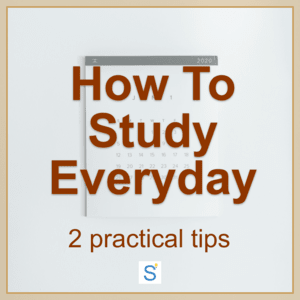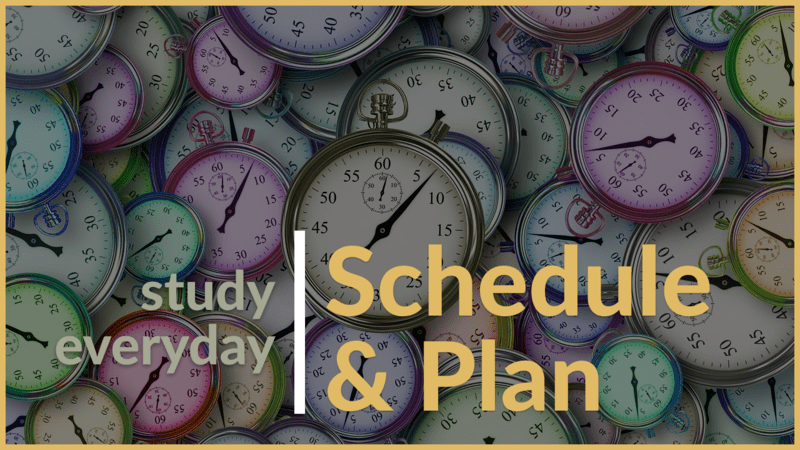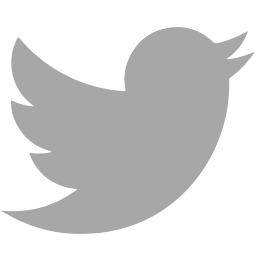How to study everyday is a very important question. The first thing is that you should start to create a habit of studying.
Study on a daily basis. But how to do this exactly?
Here are the most important things you should know:

- Don’t try to cram everything into one session
- Step outside your study room to study (literally)
- Immerse yourself into studying to make it easier
When you take care of these 3 things, you will be able to study on a daily basis. You learn faster and it will take less effort. How to do this exactly in your own life? Let’s have a look at that now…
How do I start studying every day?
The most important thing about studying every day is to plan and schedule ahead of time. Never sit down not knowing what to do. When you do that, you are losing time and energy.
Schedule your study time
Make sure you schedule your time. Know when to study. Is this early in the morning? Or do you plan to study in the evening? Do you study once a day or multiple times? Schedule when to study and you can plan your day around those sessions.
It is so much easier for your brain to know that your day starts with studying. By creating a study habit your brain expects you to sit down and study. It may even feel strange getting up, and doing something else than studying!
After you decided when you will study, make sure you know how long you will study. I work with many people who study for one hour every morning. This one-hour period at the start of the day enables them to cover a lot of material before the days of other people start.
And imagine the benefit of doing this. After their work, they don’t have to pressure themselves into studying again. They already did that. The study session they plan in the evening is already a bonus session!
When you are new to studying, especially in the morning, start with 30 minutes. Get up 30 minutes earlier and study. What you should do?
ACTION: At what time will you study (morning, noon, or evening)?
Plan each session
As I wrote earlier, when you start your study session you should not waste time finding out what to do.
That is why I want you to plan each study session.
Planning your study session can be done by literally outlining which pages you study for the duration of the course. I don’t do this. I make it easy on myself. I simply aim for doing 10 pages per day. So a 400-page book takes me 40 days.
Sometimes covering those 10 pages is easy. Other days it is a lot harder. It really doesn’t matter, as long as I get to my 10 daily pages.
I don’t treat all my sessions equally. During the day, I have at least 2 study sessions. This is one in the morning and another one at night.
The activities for each session usually vary. The morning session is more about “hardcore studying”. I read, understand, take notes, outline, and memorize what I find in my book.
An evening session may involve things like re-reading certain sections of my book, going over notes, or simple pre-reading tomorrow’s pages.
Besides these two major sessions, I may do some active recall, go over flashcards, or simply read some more during the day.
PRO TIP: One thing you can do next time is prepare everything you will go over in advance. So if you need to study pages 53 to 63 next time, open your book on page 53 now. Quickly flip through the pages and figure out what you need to have ready. This way you can start studying without thinking about pages and other materials.
Be fluid in your approach. This helps you to keep going a lot longer!
ACTION: What will you do in your next study session?

How to study at home effectively
When you schedule when and plan what you do every study session, you become already a more efficient student. Combine that with better study skills and you can do a lot of studying in the little time you have on a daily basis.
The smartest thing you can do each study session is work towards a clear goal. This can be to:
- Read 10 pages
- Outline and take notes on pages read
- Memorize your new knowledge from a mind map or using flashcards
- Use the information (by writing an article or implementing what you studied in your work)
- Share knowledge by teaching others, recording a study podcast (or audio session), or discussing it with other people
There is nothing wrong with sitting down and taking 10 minutes to read 5 pages from your book, without trying to understand or memorize the information.
It is all about making the study materials part of your life. Here’s an example. When you study a foreign language, you may live in that country, listen to podcasts in that language, or watch YouTube clips or movies on Netflix.
What you do is immerse yourself!
Do the same with your current studies (at home). Immerse yourself. Do multiple short sessions a day. Start reading and studying for 30 minutes early in the morning. Next, during the day, you test yourself using active recall or reading notes. At night, you do another reading session. You may even use that time to write a few hundred words on the topic you studied.
This way you make what you study part of your everyday life. The biggest benefit is that the materials will really come to life… YOUR LIFE!
ACTION TIP: Start by studying 2 times a day, 30 minutes in the morning, 3 times 5 minutes during the day, 15 minutes at night.
How to study when not at home?
The most important reason I want you to think about studying outside the comfort of your study room or at your desk is this. Don’t think there is one place for you to study. Stop looking at your studies as a fixed thing. Be fluid in your approach!
Studying is more than just sitting at your desk with a book. Immerse into your materials and make them a part of your life and yourself!
That is why I feel it is important you start listening to your book content or your notes. Listen to podcasts on your particular study subject.
When you commute to work for one hour per day… you are in your car about 200 hours per year!
This means that you can listen to 200 study-related 1-hour podcasts every year!
Imagine the amount of information you can cover doing that.
But wait… it gets even better.
You can build up your own library of knowledge. Take 15 minutes or so to record yourself talking about your notes or what you studied. Put this recording on your phone, and listen to it in your car, when walking, or just when you are shopping.
There is a lot of time you can study.
Even at work, you can take 5 minutes during a break, to go over some active recall questions or read some notes.
Start doing this, and you will be pleasantly surprised about all the additional study moments you have already that you are not using. Okay… get over the shock of realizing this, and then start using them.
ACTION TIP: Realize there is more time to study or go over notes. Start using that spare time!
Let’s finish by answering a funny question…
Can I study 12 hours a day?

Think about it. Studying 12 hours a day as an adult learner… If you’ve read a little more on this website, you are probably able to guess my response to this.
We simply don’t have time to study 12 hours per day! Besides work, family, and probably a bit of sleep, there just aren’t 12 hours to study on a daily basis.
And even if you had 12 hours or more of free time, I probably wouldn’t recommend you study that many hours per day.
When you learn the right study skills and you use your time wisely, you can do a lot in just a few hours. Immerse yourself into your study materials, but don’t drown!
LINK: How many hours per day should I study?
Key takeaways…
- Use your time wisely. You only have limited time to study.
- Schedule when you study and plan out what you will do (think about the 10 daily pages)
- Study sessions are more than you sitting at your desk. Think about your car, when exercising, or when you are at work
- Studying is not just reading. It is also reviewing, pre-reading, using the material
- Prepare your next session at the end of your current session
If you have any questions about this, let me know. Let’s make your study sessions more productive.



